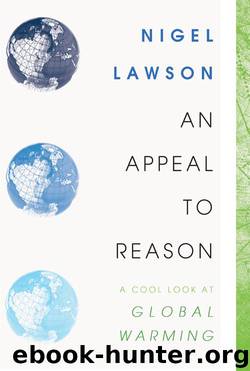An Appeal to Reason by Lawson Nigel

Author:Lawson, Nigel
Language: eng
Format: epub
Publisher: PENGUIN group
Published: 2010-09-30T00:00:00+00:00
Chapter 8
Summary and Conclusion: A Convenient Religion
It is time to reach a conclusion.
As we have seen, perhaps the most surprising fact about global warming, given that nowadays pretty well every adverse development in the natural world is automatically attributed to it, is that - despite carbon dioxide emissions rising faster than ever - it is not, at the present time, happening.
There was, indeed, a rise in the world’s temperature of about half a degree centigrade during the last quarter of the 20th century, and its effects are apparent, but even the Hadley Centre for Climate Prediction and Research, Britain’s world-renowned citadel of the conventional global warming wisdom, has now conceded (and in the light of the recorded temperature series for the first seven years of this century it could hardly not do so) that since then there has been a standstill. It officially expects global warming to resume in 2009 or thereabouts. Maybe it will; we shall see.
But the fact that this lull was not predicted by any of the immensely complex computer models which embody the conventional wisdom, is clear evidence (and as we have seen, by no means the only evidence) that the science of what determines the world’s temperature is far from ‘settled’. The earth’s climate is determined by hugely complex systems, many important aspects of which are not at all well understood. Reliable prediction is impossible.
Fortunately, despite the seemingly endless media hype, 1 opinion surveys suggest that a clear majority of ordinary people, even in the UK where politicians of all parties all sing from the same politically correct hymn sheet, instinctively sense that this is so.
Needless to say, the fact that the science is not settled does not mean that we know nothing. We do know that, through the so-called greenhouse effect, carbon dioxide in the atmosphere warms the planet, and that, ever since the industrial revolution, man has been adding to the amount of carbon dioxide in the atmosphere - and continues to do so - by his reliance on carbon-based energy. So it might be reasonable to suppose that, other things being equal, the world is likely to get warmer.
But that is where the uncertainty takes over. In the first place, other things, including the natural forces that influence the earth’s temperature, are most unlikely to be equal. And in the second place, even if they were equal, there is considerable dispute among climate scientists about how great the consequent warming effect of increased CO 2 concentrations in the atmosphere would be.
Again, as we have seen, the conventional wisdom, as spelled out in the 2007 Report of the Intergovernmental Panel on Climate Change (but before the early-21st century warming lull was officially acknowledged), is that between now and the year 2100, we can expect a warming of between 1.8°C/3.2°F and 4°C/7.2°F.
The notion that, even if it were to occur, this would be such a disaster that we need to take radical action now to cut back on carbon dioxide emissions in order to ‘save the planet’ has been seen to be wholly without foundation.
Download
This site does not store any files on its server. We only index and link to content provided by other sites. Please contact the content providers to delete copyright contents if any and email us, we'll remove relevant links or contents immediately.
The Secret History by Donna Tartt(18059)
The Social Justice Warrior Handbook by Lisa De Pasquale(11930)
Thirteen Reasons Why by Jay Asher(8400)
This Is How You Lose Her by Junot Diaz(6402)
Weapons of Math Destruction by Cathy O'Neil(5780)
Zero to One by Peter Thiel(5446)
Beartown by Fredrik Backman(5293)
The Myth of the Strong Leader by Archie Brown(5204)
The Fire Next Time by James Baldwin(4989)
How Democracies Die by Steven Levitsky & Daniel Ziblatt(4933)
Promise Me, Dad by Joe Biden(4890)
Stone's Rules by Roger Stone(4819)
100 Deadly Skills by Clint Emerson(4648)
Rise and Kill First by Ronen Bergman(4528)
A Higher Loyalty: Truth, Lies, and Leadership by James Comey(4521)
The David Icke Guide to the Global Conspiracy (and how to end it) by David Icke(4349)
Secrecy World by Jake Bernstein(4343)
The Farm by Tom Rob Smith(4294)
The Doomsday Machine by Daniel Ellsberg(4222)
